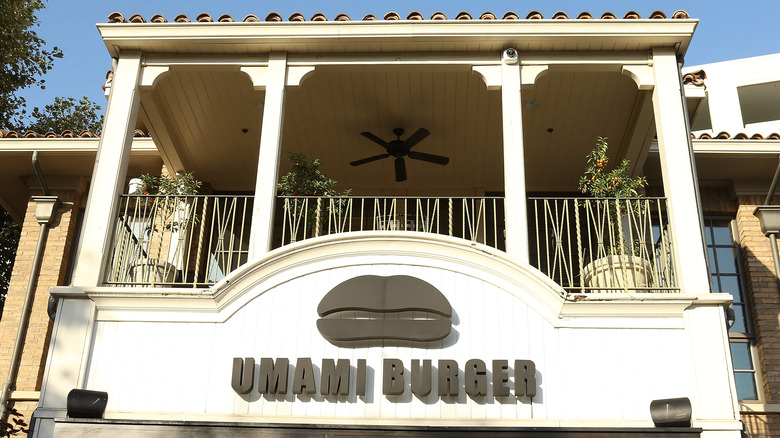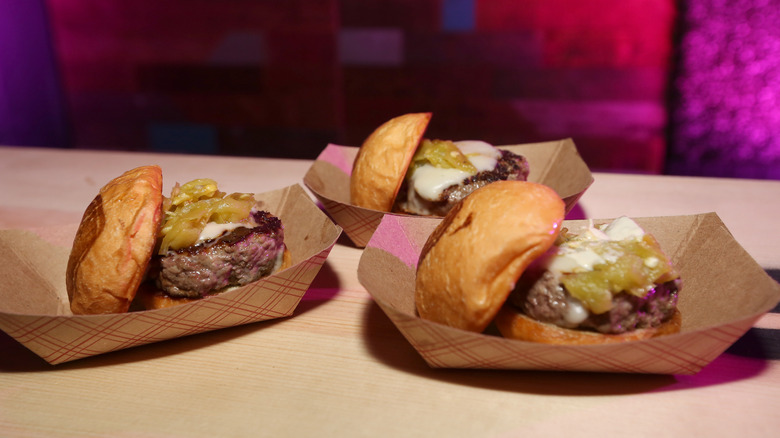The Rapid Rise And Fall Of Umami Burger
Fifteen years ago, foodies in Los Angeles were introduced to their newest obsession: Umami Burger. The upscale burger chain, founded by former wine bar owner Adam Fleischman, opened its first location in 2009. It expanded rapidly, first within the Golden State, and then to other major metropolitan areas. Fleischman's concept capitalized on the phenomenon of the "gourmet burger" that swept the culinary world in the mid-aughts and added his own signature, flavorful flair.
At its peak, Umami was the shining star and cornerstone of a burgeoning food empire, helmed by Fleichman. By 2012, the Umami Restaurant Group had opened dozens of Umami Burger outposts — along with the personal pizza chain 800 Degrees and a posh Umamicatessen food court — and developed plans for several other Umami-related businesses. With their signature logo-stamped buns, gourmet ingredients, and painstaking preparation, Umami burgers were something of a status symbol in the restaurant's heyday and quickly became one of LA's buzziest foods.
But as the chain expanded, the brand's reputation went downhill, and many of its locations closed within several years of opening. Nowadays, hospitality juggernaut SBE Entertainment Group owns a majority stake in the restaurant group, and the brand seems to have ceased the majority of its operations. To understand the trajectory of this once-lauded restaurant chain, we need to examine the reasons behind its explosive popularity and the dangers of overexpansion.
Umami Burger made waves with its focus on flavor
According to Adam Fleischman, the concept of Umami Burger came to him as an "aha!" moment while he was eating an In-N-Out Double Double— the West Coast burger famously beloved by celebrity foodies like Anthony Bourdain. Fleischman realized that the flavor that made these burgers so irresistible was the same one found in staples of Asian cuisine (like fish sauce and MSG) and in sharp, aged cheeses: umami.
The term umami was coined in 1908 by Japanese chemist Kikunae Ikeda, who discovered that foods particularly high in the amino acid glutamate had a unique savoriness. In 2002, researchers found designated L-glutamate receptors on the human tongue, and the flavor was officially adopted by the scientific community as a "fifth taste" — after salty, sweet, sour, and bitter. Fleischman, struck by the lucrative potential of maximizing this taste in fast food, set out to design a menu with umami as its north star. The resulting burgers used ingredients like soy sauce, dried fish heads, porcini mushrooms, and Parmesan to enhance their umami palette.
Within two years of opening, Umami Burger had five high-volume LA locations under its belt — plus one in San Francisco — and received major financial backing from SBE Entertainment Group. The plan, per the Los Angeles Times, was to open another 35 outposts nationally by 2014, and initially, that goal seemed within reach. Enthusiastic endorsement by celebrity chefs, high-profile partnerships with Hollywood stars, and a unique, chef-inspired concept set the chain apart from its nostalgia-driven peers and skyrocketed its cachet — momentarily.
Locations dwindled as trends shifted
Despite its once-rising stardom, today, our search for an Umami Burger location yielded few results. The brand's website and Instagram direct you to a third-party ordering platform, GO by Citizens, with no available locations displayed. Going by Yelp and Google Reviews, all Los Angeles-area Umami Burgers outside of their airport outpost have closed, despite the city once being the company's primary market. The chain does appear to continue operating internationally in Paris and Japan and at food markets in New York and Atlanta.
How did the Umami brand decline so dramatically? Former customers blame overexpansion and a resulting drop in quality. In its early years, founder Adam Fleischman told LA Magazine that he didn't want to "take any shortcuts" — in fact, he wanted to make the process "longer and harder." When restaurant chains expand rapidly, however, it's nearly impossible to maintain this level of commitment to painstaking groundwork and high-quality ingredients, especially given the profit-driven motives of shareholders.
Changing trends in the food industry played a role, as well. As some food writers have noted in recent years, the popular burger style of the moment has moved away from fancy, gourmet delicacies and toward the humbler smash burger. As beef prices continue to rise and restaurant profit margins get thinner, upscale establishments are often losing money by offering a burger on their menu, which helps explain this shift. In a food industry wracked by inflation, it remains to be seen whether Umami Burger's decadent take on an American classic could ever make a comeback.


